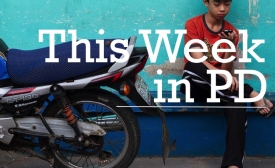social media
In the realm of influencing relations between nations, digital media has suddenly unpinned the power to communicate from the almost exclusive control of the state. Thanks to digital platforms such as social media, state actors must now compete with non-state actors for a voice in the international arena as well as for legitimacy in the eyes of the public—including their domestic one.
While Spaso House is not neglecting digital diplomacy under Ambassador Tefft, the online buzz generated by Ambassador McFaul in Russia certainly seems to have dissipated in a big way.
The explosion in digital warfare tops the list of public diplomacy developments around the world in 2014, as identified by the University of Southern California’s Center for Public Diplomacy (CPD). Information operations by non-state and state actors alike have become a major factor in the 21st century.
So much for world peace in 2015. A selfie taken by a Miss Universe contestant, Doron Matalon, who represents Israel, has caused a huge stir – because one of the other contestants in the photo happens to be Saly Greige, Miss Lebanon.
A team of analysts at King’s College in London is building an exhaustive database of western Islamic State fighters – through Twitter and Facebook.
Islamic State social media accounts are circulating disturbing and graphic images seemingly showing the executions of gay men, stoning of an alleged adulterer and other public executions. The barbaric acts of violence seem to have occurred in Iraq’s Nineveh province and Mosul.
Longtime CNN anchor Jim Clancy has left the cable news network following a controversial exchange on Twitter over the Charlie Hebdo attack in which he both mocked pro-Israel advocates and used a disability slur.

This week in Public Diplomacy, the use of new media and technologies dominated the global dialogue.







